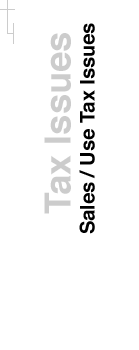 | Leases & Rentals |  | ||||||
| home » sales/use tax issues » leases & rentals » | ||||||||
 | As with almost everything else, the taxation of leases & rentals varies by state. There are three possibilities. First, in many states, the renter, or lessor, is considered a reseller and therefore buys the item using a resale certificate but must collect the tax on the rental or lease from the renter or lessee. In these states the lease is a taxable transaction. Second, in some states, leases or rentals are not taxable therefore the lessor will be responsible for paying the tax when they buy the item from the supplier. Third, in certain states, the lessor or renter has a choice. They can either:
Assuming you are in the first state where the lease or rental of tangible personal property is taxable there are some significant issues you need to be aware. The first issue is the taxable basis of the lease or rental. In most states the taxable amount includes all items the lessee is required to pay under the terms of the lease or rental agreement. This can include items such as personal property taxes the lessee is obligated to pay under the lease agreement. You must determine the taxable measure. If you sell something to a buyer on a conditional or installment basis and you invoice finance charges on that sale, in most states, the finance charges are not taxable if they are separately stated. However, when you lease or rent the item, the tax is due on the full rental or lease amount including any finance charges that are buried in the lease payment amount. Another issue that comes into play is the timing of the payment of the tax. What type of lease did you enter into? If you enter into a transaction to lease an item to your customer at the end of which the customer can buy the item for a nominal amount, such as ten dollars, then the true nature of the transaction is not a lease but a sale (capital leases are described in FASB 13 from the AICPA). In this case, the tax is due when the sale is made. If the true nature of the transaction is an operating lease or rental, then the tax is due on each rental or lease payment. In this case the tax is spread over the term of the lease agreement. What if you lease equipment with an operator? Would this be taxable? The answer generally depends on who controls the equipment while it is in use. If the lessor controls the equipment then the transaction is generally considered a sale of a service and if that service is non-taxable the transaction is non-taxable. However, if the lessee controls the equipment, giving the operator instructions and directions in the use of the equipment, then the transaction is considered a lease or rental and is normally taxable, usually including the cost of the operator. As you can see the taxation on leases or rentals varies by states and circumstances. As with practically everything else involving sales and use taxes you must research the state or states where you lease or rent property to determine how they are handled in those states. In doing your research, remember the issues mentioned above.
Feel free to call or e-mail us to discuss any tax issues you may have.
| |||||||
| Last modified on Sat Oct 18 2014 23:40:19 UTC. | ||||||||
| 25 April 2024 | About Legal Privacy Contact Accounting Policies & Procedures Corporate | top | © 2024 | |||||